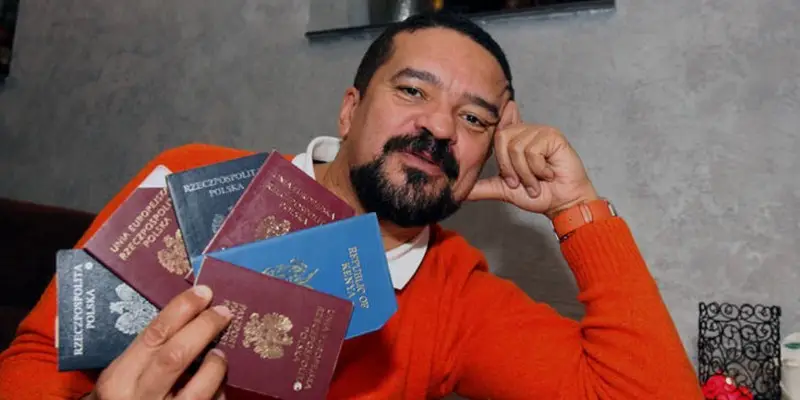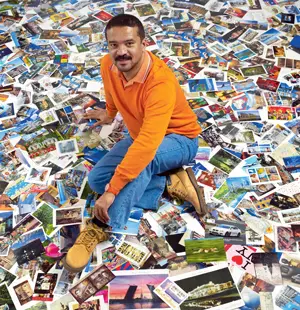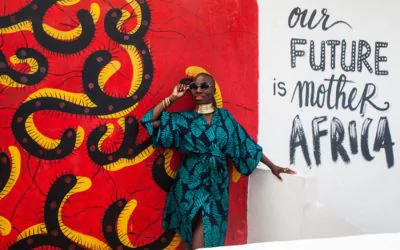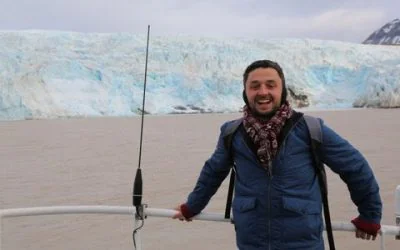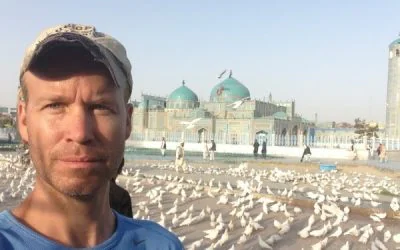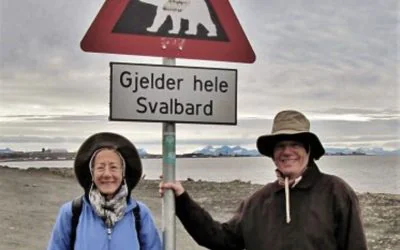Q: Slawek, you are half Kenyan and half Polish. What elements of these two very different cultures do you find in yourself? Has this mix helped you travel more, do you think? How?
It is true that I have spent some of my childhood in Poland and some in Kenya and as such since my early days I have been an observer of cultural differences (and similarities) across the two continents. My relationship with my Polish grandma (she only had 2 grandchildren) was quite different from the one I had with my Kenyan grandma (she had over 30 grandkids). Both were Christian, but my Kenyan grandma was a lot more religious – praying before every meal and reading the Bible in the evenings. My Polish grandma read many classical books and took a lot more interest in theatre and film.
Sometimes their views seemed in stark opposition. They couldn’t both be right, I thought. The truth must lie in the middle – I would think. But then, it would mean that they are either both wrong or that their seemingly opposing truths are actually part of a larger, overarching Truth. At the young age of 10 or 12, I realized that there is no single truth. I had the choice of either adopting the “Polish truth” or the Kenyan one or crafting my own “truth”. I decided to follow my own route. My own path through life.
Has it helped me travel more? I am convinced it has. In many different ways. It made me open to the world. And more interested in digging deeper, well below the surface of what things appear to be. From early childhood I became quadro-lingual (Polish, English, Swahili and my grandma’s language – Kikuyu) and it became easier to later on add more languages. Interestingly – my Polish grandparents spoke good German (they met while they were forced labourers on a German farm during WWII). My dad as well as all of his numerous siblings spoke 4- 5 languages each. My mum studied a number of oriental languages (including Swahili, old Amharic, old Hebrew) at the university (that’s how my parents met).
Travel has also been in my family. My Polish grandma’s grandfather was a Frenchman. My mum was born in Germany and worked there when she became an adult. My dad came to study in Poland and travelled extensively around the world when he was a senior civil servant in the government of Kenya (he worked in the same Ministry of Planning and Finance with the dad of Barack Obama). One of his sisters worked in London, at Buckingham Palace, a younger brother studied in Switzerland. My parents had friends in many parts of the world.
In summary, my mixed background definitely created many opportunities. My first plane flight from Poland to Kenya came in 1969 when I was only 4 years old, and my first solo flight from Kenya to Germany was when I was only 6. I often went on holidays to Kenya when I lived in Poland or to Poland when I lived in Kenya.
Q: How did you start the idea of travelling to all the countries in the world? Which were some of the most difficult to visit and why?
My parents used to live in a small house on top of one of the hills making up the Ngong Hills (made famous by the movie “Out of Africa”), some 30 kms from downtown Nairobi. The hill offered a very spectacular view and our house became a popular weekend destination for many of our friends and family. One family friend was a Mrs Roche who had started one of the first backpackers’ hostels in Nairobi. She would often visit us accompanied by some of her hostel guests, young travellers from all over the world. I was always amazed to hear their stories. I started making plans of how I will be criss-crossing all the continents when I grow up.
By January 2000, I had visited some 84 countries, mainly in Europe and Africa (in 1989 we drove a Land Rover from Poland to Kenya with 2 Polish university friends). It is then that I decided to visit the remaining 140 countries and territories. Since I had planned to retire by 2013 and I wanted to visit all the countries before retiring, I had to visit some 10 new countries every year. I had some very good years and hence completed the list by 2009.
The most difficult to visit were the ones in the war zones, like Afghanistan, Iraq or Somalia as well as Equatorial Guinea, which is the most closed country in the world. It is a small oil-rich country which sees every tourist as a potential security threat. They had a failed coup d’etat which was organized by foreign mercenaries and since then have virtually stopped issuing tourist visas.
Q: Could you share a travel story that made a great impact on you?
It was on the morning of my birthday that I landed in the Northern Marianna Islands in the Pacific. Later in the day, I met some two gorgeous Russian girls at the cashier in a supermarket. They were surprised to see a local (I appear local in most exotic locations I travel to) speak their language and they invited me to a birthday party of one of their friends. There were 8 or 9 of them, all gorgeous and only two men (me and an American guy who had fallen in love with one of the girls) and we had an all-night long beach party with BBQ, music, dancing, swimming under the moonlight and lots of fun. When I heard that the girls were go-go dancers I initially looked down on them. I was a successful management consultant at the time working for a very reputable company, one of the Big 5.
It is only later that I realized how foolish it was for me to look down on them. They were all students and classmates and came to Marianna to earn cash to buy apartments in Vladivostok that normally would have been way out of their reach. They avoided casual sex and kept each other mobilized and disciplined to stay out of troubles way. Their two apartments were spotless clean, each of the girls taking a turn to clean up on a daily basis.
They invited me to see their strip show the next night. Some seemed a little awkward on the stage, somewhat out of place, while others danced very professionally. I discovered that they all arrived on the Islands at the same time and none of them had any previous experience of pole dancing. The difference in their performance of the day was a result of the differences in attitude, in the dedication and focus. At the time we were 8 partners in our local consulting practice and I wondered what would an outside observer say about my level of involvement compared to that of the other 7 colleagues.
But the biggest impact came later. Whereas when I first got into the club, all the girls came out to greet me, happy to see their newfound friend and eager to make me feel at ease, minutes later their feelings towards me seemed to drastically cool off. They would come to my table to talk to me but only for 1-2 minutes at a time and none would sit down and join me at my table. Only one of them agreed to but even she left after just 10-15 minutes of conversation and after having only one drink (her fancy drink turned out to have been just ordinary tea). I was puzzled and a little disappointed because they were telling me about what was going on in the club and how they work on groups of Japanese tourists to extract the maximum amount of cash from their pockets for drinks, tips, etc. I found their insights very fascinating.
It is only when I was presented my bill on leaving the club that I understood their changed attitude towards me. In addition to the USD 20 for the 2-3 beers that I had had, there was a USD 40 charge for her drink (remember? this was just tea in a fancy glass) and another USD 40 for the 15 minutes conversation at my table. I was very grateful for them not taking advantage of me – a guy who they did not really know, knew they would never meet again and couldn’t care much for. They showed full integrity, however.
I walked out of the club realizing I was very naive both in not understanding how this segment of the “entertainment business” really works (clients are shaved clean like ewes on an Australian farm, but the people who benefit are not the dancers but the owners of the clubs) and also in assuming pole dancers were lower on the integrity ladder than professionals in consulting, law firms or investment banks. How many professionals would have the integrity not to take advantage of a client who is pushing money onto their laps?
Q: Which country was the most different to your pre-trip ideas about it? How so?
I try not to read anything about the places I am planning to visit. I do not want to spoil my fun at “discovering” something new for myself. Even at the risk of missing out on some must-see attractions. I am always of the mind that I will have – one day – an opportunity to revisit the country so I do not necessarily have to see it all on my first visit. Unfortunately in this age of mass communications, travel magazines, travel channels, etc it is very difficult to go to a place I know absolutely nothing about.
The biggest surprise for me was Bhutan. At first I hated the idea of having to plan and fix your trip in advance (the exact arrival dates, flight from Kathmandu, exact itinerary) and for having to pay an exorbitant EURO 260 per day (I had to pay a surcharge for not travelling with a group). To add salt to injury, my guide arrived at the Paro Airport over 2 hours late and … drunk. I was determined to lodge a complaint and to ask for a replacement guide but he won me over during the 1,5-2 hour drive to the capital, Thimpu.
I saw a big crowd around one of the houses we were passing and asked about it. The guide got the driver to stop, turn around and drive into the compound. That’s how I ended up gate crashing the first of my four weddings and a funeral during the 5 days’ visit to Bhutan. The guide was very social and had no qualms walking into people’s parties. Officially it was to show me the Bhutanese culture from a local’s perspective but his other motive was to get more opportunities to drink the locally brewed alcohol.
I was amazed by the country’s very rich and living culture, by the systemic efforts to preserve it and teach it to the next generations. By the level of education and knowledge of English. By the general cleanliness and order. By the unique architectural style. By the country’s efforts to preserve nature. And by the raw beauty of the mountains, valleys, the entire scenery. And by the friendliness of the people. Welcoming smiles everywhere. On several occasions we had run into groups of villagers sitting around a tree engaged in very lively discussions (often led by ladies) about some local affairs like what to spend the local investment budget on. This had the semblance of a perfect democracy, at least at the local level.
We became friends with my drunken guide. I got invited to his home and met his family and children. He seemed genuinely embarrassed by his addiction to alcohol and he agreed for me to give his tip directly to his wife so that the money would not end up in a local liquor store. I am not sure how he did it, but I ended up getting an additional, complimentary night at a government-run hotel near the border with India.
Leaving the country I was deeply impressed with Bhutan’s approach to sustainable development and harboured no resentment for the controlled approach to tourism, quite different to the neighbouring Nepal.
Q: To the best of our knowledge, you are the only African country passport holder who has done all the UN countries. Do you think that in the near future there may be others?
Travel is not one of the priorities for many of my friends in Africa. Predominantly because of the lower standards of living in Africa. But even many of my well-to-do friends who could afford foreign travel do not travel much. Not even to see national parks within Kenya. Surprisingly, travel around Africa is a lot more expensive than travelling around Asia or Latin America. Due to open skies and the advent of low-cost airlines, flying around Europe is a lot cheaper than around Africa. Distances are large, modes of transport expensive and unreliable.
There is no tradition of travel. Until 3-4 generations ago, African communities were relatively isolated with many superstitions and tabus preventing people from venturing beyond their villages. Surrounding forests were seen as being populated with dangerous animals, ghosts, enemy tribes. Travel is relatively a new phenomenon in Africa even when compared to Poland where people had been travelling since many centuries. Even the harsh years of communist isolation had not managed to quell Poles’ appetite for travel and curiosity of far away lands.
But then I believe the travel bug will not take long to establish itself firmly in Africa, despite the high costs, the problems with visas and other objective barriers.
And a final note on this topic. I am sure there must be other Africans who have visited every country in the world. Perhaps some South African? They might just not have made a big fuss out of the fact.
Q: You are also an established author in Poland on the field of real estate. Can you elaborate on your career in this?
In parallel to following a career path at a large management consultancy, I was using my savings to invest in a portfolio of apartments for rent. My goal was to retire early. I was able to do exactly that in May 2009 at the age of 43.
Since then, my mission is to assist as many people as I can achieve financial freedom. This is a state when your monthly cash in-flows from a source of passive income (like rental income) exceed the monthly costs of maintaining the lifestyle you and your family have become accustomed to. When this happens you no longer need to work for a living.
I realize my mission by sharing my experiences and knowledge – I have written 5 books so far, I write a blog – www.fridomia.pl, I have given hundreds of presentations all over Poland but also in the UK, Ireland, US, Canada, Australia and Singapore. I have also taken it upon myself to civilize the Polish residential market which was behind the ones in the West and even in Kenya. I also created a residential property management company (there wasn’t one in Poland), which today manages over 1500 rental properties. In the last two years, we also helped individual investors source and buy over 350 below-market-value rental properties. Properties in Poland are a lot cheaper than in Western Europe (the cheapest we found cost only USD 5.500) and give significantly higher rates of return (depending on the city from 7,5 to 15% annual yield without considering any potential rise in the value of the property itself).
Our newest initiative is a platform for group investing in rental properties in a crowd fund investing formula. During 2015, we have set up 3 special purpose investment companies which raised several millions of Polish zloty. These companies will help hundreds of people get closer to achieving their financial freedom.
Q: Have you considered also writing a book about travelling?
Yes, I have. Many of my friends have been encouraging me to write up the many stories from my travels I have shared with them. However, after looking at how many travel books linger on Polish bookshelves, I decided I will not have anything particularly new to contribute in this area and have chosen to spend my time on writing books on financial freedom and investing in real estate instead. Unlike travelling, real estate is a very local business and so I feel there is a bigger gap to fill in this area. Plus this is more compatible with my new personal mission.
Q: Given that you have been to all the countries, what form does your travel take nowadays? Do you still have travel aims?
Visiting all countries was obviously an important milestone, but is definitely not the end of the road for me. My travelling thus far has been rather superficial, rarely spending more than a week or two in any given country.
Today I travel at a more leisurely pace, spending more time in those countries that I liked best. I combine travel with learning the local language – it is great for gaining a better understanding of the local culture but it also gives good exercise to my brain cells. Exercise that I hope will slow down their decay.
I also spend 2-4 weeks of every year in a ‘sanatorium’. So far I have been to sanatoriums in Ukraine, Slovakia, Georgia, Uzbekistan, India. Recently I returned from a 4 weeks sanatorium stay in Lithuania. It was great not only for my health but I also learnt a bit of the local language and immersed myself in the local culture.
In future, I want to be spending every winter somewhere in the tropics, every winter in a different country and every summer working somewhere in Europe. Those jobs will be rather low-skill and low-pay. Given that I earn enough passive cashflows from my real estate portfolio, the main purpose of working will not be to earn money, but to gain broader perspectives on life. And to immerse myself in the countries and cities I will be visiting.
Q: What are your travel plans for the next 6 months?
I will be spending 4 months from December 2015 to April 2016 in Singapore learning Mandarin. Tempting as it will be, I will try not to travel around South East Asia, preferring to focus on my Chinese language classes instead. I have no plans yet as to how and where to spend the 2 spring months in Europe. Most likely somewhere in Poland, but I might end up in Scotland, Ukraine or Italy.
Q: A final ‘quirky’ question. If you could have one superpower, what would it be and why?
Never really thought or fantasized about having any superpowers. But if I had to pick one, it would be the ability to travel into the future. I think I could help more people achieve financial freedom. And also potentially save myself and others from any trouble ahead.
Thanks for your interest in my “story”.
The photos in this article are taken from the personal collection of Slawek Muturi


